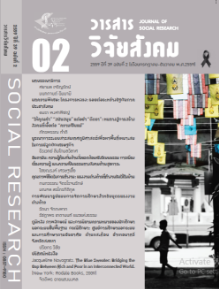อันดามัน: ความรู้ท้องถิ่นด้านสิ่งแวดล้อมเชิงวัฒนธรรม การเมืองเรื่องความรู้ และความเป็นธรรมทางสังคมด้านสุขภาวะ
Main Article Content
บทคัดย่อ
บทความนี้เป็นการอธิบาย “การเมืองเรื่องความรู้และความเป็นธรรมทางสังคมด้านสุขภาวะ” ที่เป็นที่มาของความขัดแย้งเกี่ยวกับโครงการพัฒนาขนาดใหญ่บริเวณชายฝั่งทะเลอันดามัน จังหวัดกระบี่ โดยมีวัตถุประสงค์เพื่อศึกษาความรู้ท้องด้านสิ่งแวดล้อมเชิงวัฒนธรรมและสุขภาวะของชาวประมงพื้นบ้าน การนำข้อมูลดังกล่าวมาวิเคราะห์และเปรียบเทียบเนื้อหากับรายงานการวิเคราะห์ผลกระทบสิ่งแวดล้อมและสุขภาพของโรงไฟฟ้าถ่านหิน และรายงานการวิเคราะห์ผลกระทบสิ่งแวดล้อมโครงการท่าเทียบเรือคลองรั้ว จังหวัดกระบี่ โดยใช้แนวคิดความรู้ท้องถิ่นด้านสิ่งแวดล้อมเชิงวัฒนธรรม และแนวคิดความเป็นธรรมทางสังคมด้านสุขภาวะ เก็บข้อมูลระหว่างเดือนเมษายน 2557-เดือนกรกฎาคม 2559 ใน 8 ชุมชนที่ตั้งอยู่บริเวณชายฝั่งทะเลอันดามัน จังหวัดกระบี่ ด้วยวิธีการทางมานุษยวิทยา การวิจัยแบบไทบ้าน และการวิจัยเอกสาร ผลการศึกษาปรากฏดังนี้
ประการแรก ชายฝั่งทะเลอันดามัน จังหวัดกระบี่ มีเมืองปกาสัยที่เป็นเมืองท่าที่สำคัญในการทำการค้าทางบกกับรัฐต่างๆ ในมหาสมุทรอินเดีย และแปซิฟิก และเป็นเส้นทางเจ้าพระยานครค้าช้าง ก่อนที่จะพัฒนามาเป็นเมืองกระบี่ในปัจจุบัน ชุมชนปกาสัยและชุมชนอื่นๆ ในบริเวณนี้มีกลุ่มคนที่หลากหลาย แม้มีความแตกต่างทางวัฒนธรรม แต่มีระบบความสัมพันธ์ทางสังคมที่ทำให้สามารถอยู่ร่วมกันอย่างกลมกลืน ขณะที่คนในชุมชนมีวิถีชีวิตและเศรษฐกิจขึ้นกับการประมงเป็นหลัก โดยชาวประมงพื้นบ้านมีความรู้ด้านนิเวศวิทยาที่ลึกซึ้ง มีโลกทัศน์ที่เคารพต่อธรรมชาติ '
ประการที่สอง จากการนำข้อมูลดังกล่าวข้างต้นมาวิเคราะห์เปรียบเทียบกับรายงานการวิเคราะห์ผลกระทบสิ่งแวดล้อมและสุขภาพของโรงไฟฟ้าถ่านหิน และรายงานการวิเคราะห์ผลกระทบสิ่งแวดล้อมโครงการท่าเทียบเรือคลองรั้ว จังหวัดกระบี่ ปรากฏว่ารายงาน EIA และ EHIA มีการลดทอนคุณค่าของพื้นที่ทั้งในเชิงนิเวศวิทยาและเศรษฐกิจ รวมทั้งลดทอนความสำคัญของอาชีพประมงข้อมูลในรายงานยังมีฐานมาจากความรู้แบบห้องทดลอง และนำไปสู่การลดทอนจำนวนคนที่จะได้รับผลกระทบ '
ประการที่สาม ในประเด็นความเป็นธรรมทางสังคมด้านสุขภาวะ รายงาน EHIA และ EIA ใช้นิยามสุขภาพแบบเก่า ทำให้ไม่เห็นสุขภาวะที่เป็นองค์รวมที่มีฐานมาจากการมีทรัพยากรที่สมบูรณ์
เพื่อให้เกิดความยุติธรรมจากการพัฒนา บทความนี้เสนอว่า การตัดสินใจเกี่ยวกับโครงการขนาดใหญ่ ต้องให้มีการทำรายงานคู่ขนานโดยการวิจัยที่มีฐานจากชุมชนและนำไปในกระบวนการตัดสินใจร่วมกับรายงาน EHIA และ EIA
The Andaman: Traditional Ecological Knowledge, Politics of Knowledge, and Social Justice and Healthy Society
This article explains the “politics of knowledge, and Social Justice and Healthy Society” as the cause of conflicts in two development schemes in the Andaman Coast, Krabi Province. The traditional ecological knowledge (TEK) and wellness of the local fishermen was explored, analyzed and compared with two reports: EHIA Krabi Coal Power Plant Project and EIA Klong Ruo Coal Pier. As the study concept, the traditional ecological knowledge (TEK) and social justice annex with the new definition of wellness were used to analyze the data, which had collected from 8 communities in the coastal areas of the Andaman, Krabi province, from April 2014 to July 2016, Using of ethnographic method, villager research methodology and documentary research, the findings revealed as following:
Firstly, as the coastal Andaman, Krabi, “Muang Pakasai” was an important ancient sea port with inland trading among different states in the Pacific and Indian Ocean. Moreover, it used to be a route of elephant trading among the noblemen before redeveloped as the current Krabi city. In social and cultural dimensions, Pakasai and other communities in this coastal area have gathered divers ethnics of their settlements. Nevertheless, all of those have been living altogether in their social relationship system, harmoniously. The main livelihood and economy of the community is fishery, and the local fishermen attain their ecological discernment in view of natural respect profoundly.
Secondly, the comparison analysis among the research conducted by villager research methodology and the two reports of EHIA and EIA –Krabi Coal Power Plant and Klong Ruo Coal Pier Projects found that both reports had devaluated the wetland, both in ecological and economical domain, as well as the significance of the fishery line. Because the knowledge content of the reports are based on laboratory knowledge, the outcome was led to diminish the number of people affected.
Thirdly, in view of social justice and healthy society, both EHIA and EIA Reports defined the ‘health’ with the out-of-date term. So, they could not represent the holistic healthy society which were based on ecological richness valve.
To reach just society by development, that by large scale projects, the impact assessment research process required traditional based knowledge as well as formal EIA/EHIA study. Both knowledge are needed by decision making process.
Article Details
1) บทความนี้เป็นลิขสิทธิ์ของสถาบันวิจัยสังคม จุฬาลงกรณ์มหาวิทยาลัย แต่ความคิดเห็นและเนื้อหาเป็นของผู้แต่ง
2) ทัศนะและความคิดเห็นที่ปรากฏในบทความในวารสารวิจัยสังคมและปริทัศน์ สถาบันวิจัยสังคม จุฬาลงกรณ์มหาวิทยาลัย ถือเป็นความรับผิดชอบของผู้แต่งบทความนั้น และไม่ถือเป็นทัศนะและความรับผิดชอบของกองบรรณาธิการวารสารวิจัยสังคมและปริทัศน์ สถาบันวิจัยสังคม จุฬาลงกรณ์มหาวิทยาลัย กองบรรณาธิการไม่สงวนสิทธิ์ในการคัดลอก แต่ให้ระบุถึงการอ้างอิง


